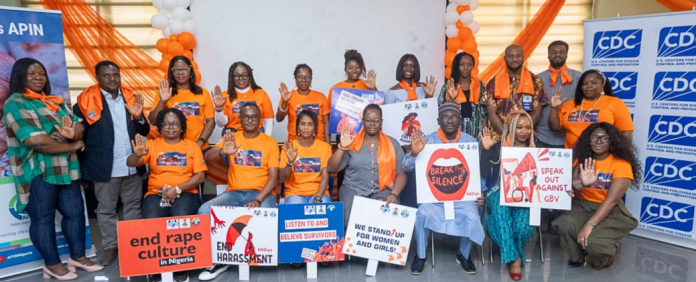The US Centers for Disease Control and Prevention (CDC) and APIN Public Health Initiatives have urged a collective fight against gender-based violence (GBV) while reaffirming their commitment to supporting survivors.
Speaking during a media roundtable in Abuja, the Deputy Director for Programmes at U.S. CDC Nigeria, Dr. Jerry Gwamna, stressed the devastating physical, mental, and social impact of GBV, as outlined by the World Health Organization. Represented by Victor Adamu, Team Lead for Community and Gender at U.S. CDC Nigeria, Gwamna underscored the importance of collaboration to prevent and mitigate GBV’s effects.
“GBV, in any form—psychological, emotional, physical, or economic—harms the complete health of survivors. Working together as organizations and communities is crucial to prevent GBV and alleviate its impacts,” Adamu emphasized.
Highlighting the CDC’s efforts funded by PEPFAR, he noted programs designed to prevent GBV while providing life-saving support to survivors.
Mrs. Bola Thompson, Gender Technical Lead at APIN, encouraged survivors to speak out, assuring them of sustained support. “We must do more to give survivors a voice. Our fight against GBV is unyielding, and we will ensure their needs are met,” she said.
Meanwhile, U.S. CDC’s Gender and GBV Programme Specialist, Mrs. Bukola Adewumi, spotlighted strategies addressing GBV and HIV in women and girls, emphasizing the need for accessible health services. “Everyone, regardless of gender or background, deserves the highest standard of health. Our community-based interventions empower individuals to challenge harmful norms and build essential skills,” she shared.
The CDC has trained over 200 instructors and reached more than 78,000 adolescents with self-defense programs. Additionally, GBV screenings are integrated into all health services, ensuring survivors receive free post-violence care.
Adewumi further revealed the organization’s collaboration with referral centers, including police, shelters, and child protection agencies, to bridge service gaps and uphold high standards of care for survivors.
“Through WHO-standardized tools, we ensure survivors receive the best care. Together, we aim to foster safer, more equitable communities where everyone can thrive,” she concluded.

